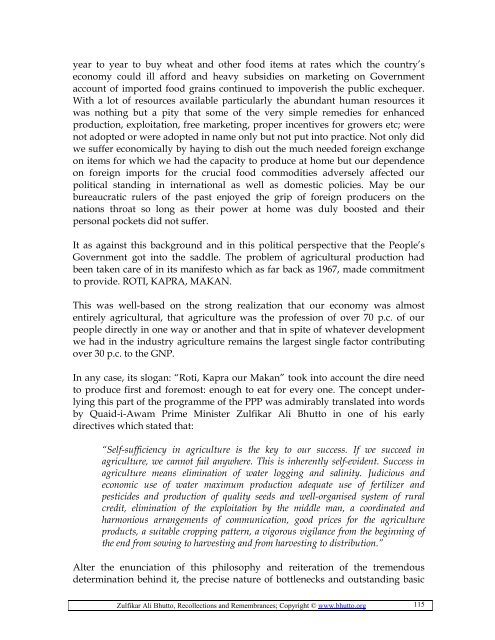Zulfikar Ali Bhutto Recollections and remembrances
Zulfikar Ali Bhutto Recollections and remembrances
Zulfikar Ali Bhutto Recollections and remembrances
You also want an ePaper? Increase the reach of your titles
YUMPU automatically turns print PDFs into web optimized ePapers that Google loves.
year to year to buy wheat <strong>and</strong> other food items at rates which the country’seconomy could ill afford <strong>and</strong> heavy subsidies on marketing on Governmentaccount of imported food grains continued to impoverish the public exchequer.With a lot of resources available particularly the abundant human resources itwas nothing but a pity that some of the very simple remedies for enhancedproduction, exploitation, free marketing, proper incentives for growers etc; werenot adopted or were adopted in name only but not put into practice. Not only didwe suffer economically by haying to dish out the much needed foreign exchangeon items for which we had the capacity to produce at home but our dependenceon foreign imports for the crucial food commodities adversely affected ourpolitical st<strong>and</strong>ing in international as well as domestic policies. May be ourbureaucratic rulers of the past enjoyed the grip of foreign producers on thenations throat so long as their power at home was duly boosted <strong>and</strong> theirpersonal pockets did not suffer.It as against this background <strong>and</strong> in this political perspective that the People’sGovernment got into the saddle. The problem of agricultural production hadbeen taken care of in its manifesto which as far back as 1967, made commitmentto provide. ROTI, KAPRA, MAKAN.This was well-based on the strong realization that our economy was almostentirely agricultural, that agriculture was the profession of over 70 p.c. of ourpeople directly in one way or another <strong>and</strong> that in spite of whatever developmentwe had in the industry agriculture remains the largest single factor contributingover 30 p.c. to the GNP.In any case, its slogan: “Roti, Kapra our Makan” took into account the dire needto produce first <strong>and</strong> foremost: enough to eat for every one. The concept underlyingthis part of the programme of the PPP was admirably translated into wordsby Quaid-i-Awam Prime Minister <strong>Zulfikar</strong> <strong>Ali</strong> <strong>Bhutto</strong> in one of his earlydirectives which stated that:“Self-sufficiency in agriculture is the key to our success. If we succeed inagriculture, we cannot fail anywhere. This is inherently self-evident. Success inagriculture means elimination of water logging <strong>and</strong> salinity. Judicious <strong>and</strong>economic use of water maximum production adequate use of fertilizer <strong>and</strong>pesticides <strong>and</strong> production of quality seeds <strong>and</strong> well-organised system of ruralcredit, elimination of the exploitation by the middle man, a coordinated <strong>and</strong>harmonious arrangements of communication, good prices for the agricultureproducts, a suitable cropping pattern, a vigorous vigilance from the beginning ofthe end from sowing to harvesting <strong>and</strong> from harvesting to distribution.”Alter the enunciation of this philosophy <strong>and</strong> reiteration of the tremendousdetermination behind it, the precise nature of bottlenecks <strong>and</strong> outst<strong>and</strong>ing basic<strong>Zulfikar</strong> <strong>Ali</strong> <strong>Bhutto</strong>, <strong>Recollections</strong> <strong>and</strong> Remembrances; Copyright © www.bhutto.org 115


